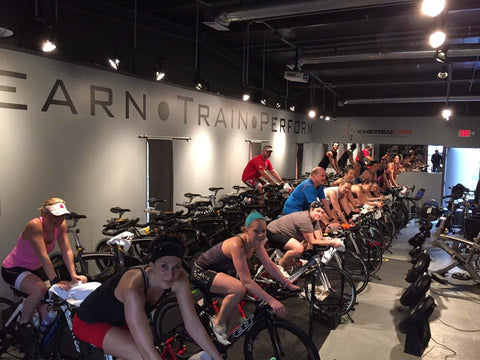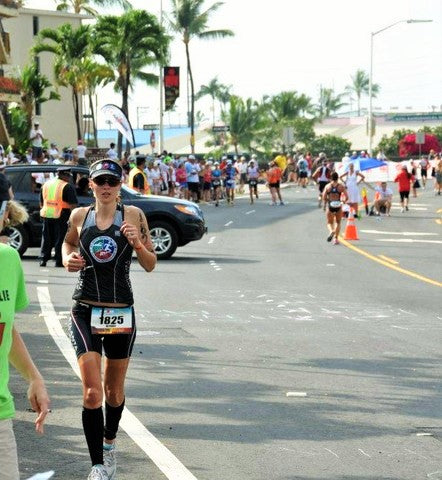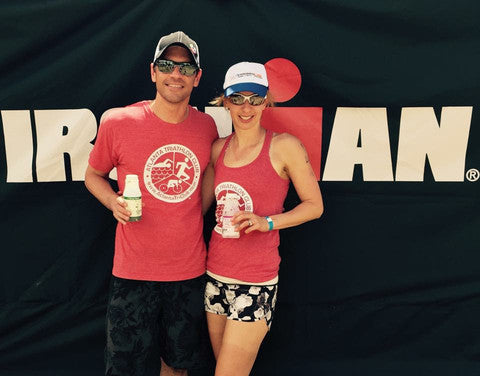Inspiring Voices: Triathletes John and Bethany Rutledge
by Dr. Sujit Sharma, CEO of Chuice
As an ER doctor caring for kids, I'm fully imbedded in the American healthcare system. While good at taking care of people when they are sick, we aren't so good at making an impact on disease prevention. The heart of the matter for less people getting ill relates to nutrition and overall lifestyle change.
Other people, outside of medicine, are now stepping in as influencers in a way healthcare providers often aren't. On social media, in gyms, wellness centers and podcasts, you can find countless individuals or groups that are beacons of inspiration. Sometimes, you come across these leaders acting as a unified pair, like this Atlanta couple, John and Bethany Rutledge, who are co-owners of the Atlanta Triathlon Club (ATC) and a spin gym called Energy Lab.

I met John and Bethany about two years ago, a year after they opened Energy Lab, an elite spin studio committed to achieving ultimate physical performance for themselves and other triathlon enthusiasts--beginners or pros looking to improve endurance, speed, and skill.

Energy Lab, Atlanta
While they were gifted athletes growing up, they both admit to some degree of complacency after college and slipping away from the active lifestyle that once defined them, a scenario that is familiar to a lot of us. John admits to becoming an active smoker during college, something he's long since abondoned. "Before John and I discovered triathlon, I would say we were as into health and fitness as the average person", according to Bethany. She continues, "I would say what we lacked was passion for a sport with a goal in particular and we definitely found that in triathlon". In today's world, we seek convenience and are often quite comfortable doing less to push ourselves physically. People finding the will to "reinvent" themselves often have something of value to share with others.

Bethany and John, in 2005 after their first 5k race
John and Bethany decided to try out triathlon together, despite neither really having a cycling or swim background. To say they dove in headfirst would be an understatement. John keeps making steady progress and achievements with Ironman and is always seeking ways to get better. Within 2 years of starting their training, Bethany qualified for Kona, for the World Ironman Championship. This is considered the biggest event in triathlon, as well as one of the most grueling athletic events known to man. She and John made the long journey to Hawaii after her second qualification, in 2012.
I was curious as to what it took for Bethany and John to go from an "average interest in health and fitness" to high-level performance. According to Bethany, "Once we discovered triathlon, our actions, including eating, training, and other lifestyle factors, became performance-centric instead of for a general, vague goal of better health. When your goal is performance it tends to make a lot of other factors fall into place and not seem like hardships."


Bethany at Kona, World Triathlon Championship 2012 John racing Ironman Chattanooga 2014
Since I have an interest in how food effects performance, I asked Bethany to elaborate… "For example we eat for performance now instead of for fun. That means that, at least 80% of the time, we are eating foods that support optimal body composition. It doesn't seem like a chore (most of the time) because the reward of continuous improvement is simply more rewarding than the immediate gratification of eating an entire pizza (John's favorite) or a vat of spaghetti (my favorite). That is not to say we don't enjoy eating our favorite foods in moderation, we certainly do!"
With all the fancy supplements and powders out there for athletes, I wondered how John and Bethany approach fueling for a race and how to optimize recovery. "The exception to trying to eat mostly clean and minimize processed foods is around training and races. The priority during this time is to eat foods that the body can most easily turn into energy (i.e. simple carbs). After the race or training session is over though it's time to replenish with real food."
Bethany continues, "What I'm getting at is when it's time to recover, you want to know you are doing something good for your body that replaces vitamins and minerals. What the body then craves is real food that supports recovery. That's where Chuice comes in for us. It's an easy way to get in all the stuff you need, which is especially helpful for those that don't have the time or inclination to procure, purchase, chop and blend 30 types of fruits and veggies! John and I both feel better when we consume Chuice. We are looking forward to continuing to use it to mark and record longer term changes in health in recovery." This was obviously music to my ear.
For the elite athlete looking to get an edge or spike in performance these days, I've found that one of two things is likely: One, they have a nutritionist who advises them; or two, they study as hard as they train and become their own nutritionist. I'm blown away these days by how many athletes and trainers I've met who know far more about nutrition than most of us doctors. As influencers, people like Bethany and John are having a direct impact on the health of others through their work with Atlanta Triathlon Club and Energy Lab. It would be safe to say that they are not only enhancing many people's lives, but saving several as well.

("Soaring" with other members of ATC)
- Sujit Sharma MD
Chuice CEO & Pediatric ER doctor, Children's Healthcare of Atlanta
@drsujitsharma

